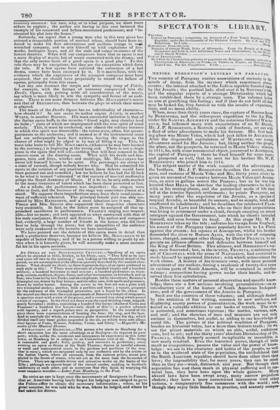AN OPERA OF THE SEVENTEENTH CENTURY. —Speaking of an opera which
he attended in l645, Evelyn, in his Diary, says, " They held us by eyes and eares till two in the morning ;" and, looking at the theatrical details of the period, we are not surprised at the effect so quaintly described by this ancient chro- nicler. What should we think, in these degenerate days, of an opera produced in such style as this ! " There were choruses of a hundred virgins and a hundred soldiers ; a hundred horsemen in steel armour ; a hundred performers on trum- pets, cornets, sackbuts, drums, flutes, and other instruments, on horseback and on foot; two lions led by two Turks, and two elephants, led by two others; Berenice's triumphal car, drawn by four horses; and six other cars, with spoils and prisoners, drawn by twelve horses. Among the scenes in the first act was a plain with two triumphal arches ; another, with a pavilion and tents; a square, prepared for the entrance of the triumphal procession, and a forest for the chase. In the second act there were the royal apartments of Bereuice's temple of vengeance, a spacious court with a view of the prison, and a covered way along which passed a train of carriages. In the third act there were the royal dressing-room, magnifi- cently furnished ; stables, containing a hundred live horses (shades of Cooke and Franconi ! a hundred live horses—only think of this!) ; a portico adorned with tapestry, and a superb palace seen in perspective. In the course of the piece there were representations of hunting the boar, the stag, and the bear. And to conclude the whole, an enormous globe descended from the sky, which divided itself into lesser globes suspended in the air, on which were seen allego- rical figures of Fame, Honour, Nubility, Virtue, and Glory."—Hogarth's Me- moirs of the Musical Drama. ATTRACTIONS OF HASIBIJR0.—The person who starts to Hamburg for a short excursion has the same advantage as at Boulogne—he requires no pass- port ; while, unlike the constraint and annoyances he experiences in this latter town, at Hamburg he is subject to no Customhouse visit at all. The living is reasonable and good ; fruit, poultry, and sucrevics in perfection ; every evening an opera or drama at the Stadt Theatre; dances in tasteful saloons, or vocal and instrumental music in the gardens and pavilions (if the wea- ther is rainy), which are surpassed only by our orchestra and by the artists at the Italian Opera, where all entrance, from the ruinous prices, seems pre- cluded to the lovers of music, who are not at the same time the favourites of Plutus. There are agreeable drives and attractive walks on the banks of the Elbe ; although we cannot boast of the eternal castles, nodding in brotherly tutiformity at each other, and so numerous that they finish by wearying the meat romantic traveller.—Letter from Hamburg, in the Post.


























 Previous page
Previous page